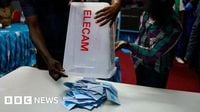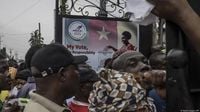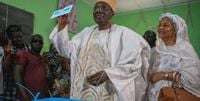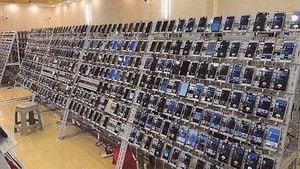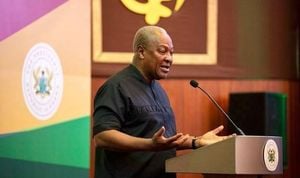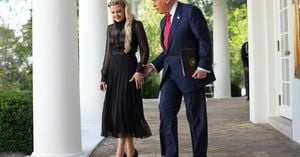As Cameroon’s political landscape braced for a pivotal moment, opposition leader Issa Tchiroma Bakary took to social media on the morning of October 14, 2025, to declare himself the victor of the country’s fiercely contested presidential election. In a nearly five-minute video filmed in his hometown of Garoua, Tchiroma called on 92-year-old President Paul Biya—Africa’s longest-serving leader and the world’s oldest head of state—to concede defeat and thonor the truth of the ballot box.
“The people have chosen, and this choice must be respected,” Tchiroma demanded in the video, as reported by Reuters. His statement, delivered with the national flag as a backdrop, urged Biya to “honour the truth of the ballot box” and offer congratulations—a move Tchiroma said would demonstrate Cameroon’s political maturity and the strength of its democracy. He went further, calling on government institutions and the military to recognize his victory and “stay on the side of the republic.”
The stakes could hardly be higher. Paul Biya, who has ruled Cameroon for 43 years, is seeking his eighth consecutive term. If successful, he would remain in office until at least 2032. The official outcome, however, remains in limbo: Cameroon’s Constitutional Council has up to October 26 to announce the results, and the government has made it clear that only the Council’s declaration is binding.
Interior Minister Paul Atanga Nji, speaking earlier in the week, warned that any unilateral announcement of results would be considered “high treason.” He reiterated, “Only results announced by the Constitutional Council are official,” and described any attempt to preempt the Council as a major red line. The government’s stance was echoed by warnings that anyone suspected of violating this rule could face serious consequences.
The drama surrounding Tchiroma’s declaration has its roots in a campaign season marked by turbulence and controversy. In June, Tchiroma resigned from his post as a government spokesperson, breaking ranks with Biya after two decades of close alliance. His campaign quickly gained momentum, drawing large crowds and securing endorsements from a coalition of opposition parties and civic groups. For many Cameroonians weary of Biya’s long rule, Tchiroma emerged as the top contender to unseat the incumbent.
But despite the energy around Tchiroma’s campaign, the odds appeared stacked in Biya’s favor. According to BBC News, Cameroon’s opposition has long complained of attempts to suppress their support. The most dramatic example came in August, when the Constitutional Council barred Maurice Kamto, a prominent 71-year-old opposition figure widely seen as Biya’s main challenger, from participating in the election. This move, opposition groups argued, further fragmented their ranks and consolidated Biya’s grip on power.
On election day, October 12, voting took place across Cameroon’s ten regions. Interior Minister Nji described the process as “hitch-free” nationwide, but the reality was more complex. In the two English-speaking regions in the west, where separatists have waged a years-long struggle, there were calls for a boycott and reports of low turnout. Many residents stayed away from polling stations, fearing reprisals from armed groups, though some did turn out to vote, according to BBC reports.
Elsewhere, the situation was tense. In Garoua, Tchiroma’s stronghold in the north, angry supporters clashed with security forces after his residence was cordoned off by authorities. Tear gas was fired, and the confrontation underscored the volatility of the moment. Earlier in the day, Tchiroma told reporters he was under threat but would not leave his home. “It is not Tchiroma who is the problem,” he said. “I place myself under the protection of God and the Cameroonian people. I am at home; I will not move. If they intend to come and take me away from home, I will not move.”
Despite these disturbances, the government maintained that the polls were held without major incidents. Minister Nji did not comment on the clashes in Garoua, instead focusing on the threat posed by candidates who might publish results ahead of the Constitutional Council. The message was unmistakable: the state would not tolerate any challenge to its authority over the electoral process.
Cameroon’s electoral law allows for results to be posted at individual polling stations, but the final tallies must be validated by the Constitutional Council. With nine candidates in the running, including Tchiroma and Biya, the field was crowded, but few doubted that the incumbent’s control over state machinery and the divided opposition would play a decisive role.
In his victory speech, Tchiroma expressed gratitude to rival candidates “who have already congratulated me and recognised the will of the people.” He described the election results as “a clear sanction” of Biya’s administration and “the beginning of a new era.” Tchiroma’s words resonated with supporters who saw his campaign as a rare chance to break the status quo, but the government’s silence and the looming threat of legal repercussions cast a shadow over his declaration.
The days following the election have been marked by uncertainty and anticipation. Vote counting—described by the BBC as still underway—will continue until the Constitutional Council’s official announcement, expected by October 26 or 27. Until then, the tension between the opposition’s claims and the government’s warnings hangs heavy over the country.
For many Cameroonians, the election is about more than just who occupies the presidency. It is a test of the nation’s democratic institutions, its capacity for peaceful transfer of power, and its ability to resolve deep-seated regional and linguistic divisions. In the Anglophone regions, the specter of violence and boycott reflected ongoing grievances and a sense of alienation from the central government.
As the world watches and Cameroonians wait, the outcome of this election—and the response of both the government and the opposition—will shape the country’s trajectory for years to come. Whether Tchiroma’s bold declaration marks the dawn of a new era or another chapter in Cameroon’s long history of political stasis remains to be seen. But one thing is certain: the stakes have rarely been higher, and the eyes of the nation are fixed on the Constitutional Council’s next move.
